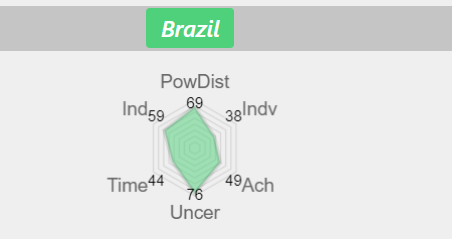OVERVIEW
The hospitality sector is prone to intercultural challenges, due to the daily interactions with people from all around the world. In this case, we will analyze how intercultural challenges in a Brazilian hotel are managed. The hotel is located in the São Paulo area and is owned by a Brazilian couple. The woman has a lot of contact with the guests, while the husband takes care of the reservations and finances. The hotel once was the couple’s entire house. Now, with some renovations, the couple shares the facilities with their guests. The hotel possesses six rooms to rent and one room for the couple. Furthermore, there is no major division between the hotel and the couple’s personal space, thus sharing and understanding is necessary for it to work.
Throughout the time the hotel has been open, hundreds of guests have checked in and checked out, each with an individual story. This results in different situations in which intercultural challenges appear. Two situations are explained in more detail.
1 – The hotel once received a couple from a state in Brazil called Rio de Janeiro. The guests booked a room for two nights and were expecting to spend a commemorative date there. The owner of the hotel, the woman, made sure to introduce the space and give some touristic advice for the guests to enjoy the town as much as possible, in a very polite and friendly way.
In Brazil, a typical stereotype of people coming from Rio de Janeiro (Cariocas) is that they are very lazy and impertinent. With that in mind, the owner of the hotel experienced actions that exactly matched their stereotype. The guests were unfriendly and demanding, even in off working hours, as explained by the owner. They expected extra services during the night when the kitchen was already closed and was always impolite. With that in mind, it was highly prohibitive for the guests to be that demanding, however, at the same time, it was inhibitive for the owner to deny their requests, since the hotel is small and more informal, and the owner wants to cause the best impression on their guests.
After the two nights, the guests had left and the hotel was able to receive new people with new experiences and stories. Furthermore, on a different occasion explained by the owner, the hotel received another couple from the same state, Rio de Janeiro, and the owners automatically linked their previous experience with the other guests from the same state and were expecting to have a harder time. Surprisingly, the new carioca guests were extremely friendly and understanding, respecting the service hours from the kitchen and the other employees, as well as good communicators with the owners, providing them an entirely different experience.
2 – Around a year ago, the hotel hosted a couple with their 6-year-old kid from Portugal. The owners of the hotel were considering a challenging experience with their potential guests from Europe, because the fact that the owners and visitors share the same language (Portuguese), does not lead to the fact they share the same culture. For this reason, the Brazilian owners looked closely on the situation to recognize potential misunderstandings early on.
For example, these two cultures have different perspectives on what is considered polite. Brazilians are very diverse, but, for the most part, they associate politeness with being friendly and loving, with sharing smiles everywhere. Brazilian social interactions are not direct. They’re not a straight “go from point A to point B”, meaning they possess a high context culture. Generally, avoid being openly rude, even when it’s necessary, and they often say “yes” when the implied meaning is “no”. The Portuguese, on the other hand, seems to be much more direct, possessing a low context culture. They’re not afraid to say what you can and cannot do, and they do so with a straight, serious face. They don’t seem to favor putting on a smiling mask to be friendly. Therefore, for Brazilians, those things can come across as very rude.
However, when the Portuguese guests finally arrived, no misunderstandings with politeness whatsoever occurred. All the negative stereotypes from the Portuguese culture were shown untrue. The family spent a wonderful week in São Paulo, treated everyone as their friends, left respectable tips and the kid even prepared a drawing of the hotel with owners portrayed there, therefore, obviously, the owners were pleased and happy. So it appears that stereotypes do not usually meet reality and that individuals do not necessarily behave in the same way, even if they have similar culture.
OUTCOME
In many situations, although coming from the same place and having theoretically the same culture and backgrounds, guests have acted differently and unexpectedly, making it not possible to expect a certain pattern of actions from people coming from the same culture. The managers of the hotel therefore have a few strategies they use to limit cultural misunderstandings and clashes, this is also linked to the underlying value of avoiding uncertainty according to Hofstede. Firstly, learning more about languages and understanding the culture of the guests including stereotype awareness. Secondly, when miscommunication occurs, recognize it early on and communicate openly with the guests to limit negative effects. And most importantly, be open-minded and do not expect the person to act based on their culture, stereotypes of that culture or based on personal previous experiences, because anyone is different and possesses their values and beliefs.
Hofstede Dimensions
https://tcps.institute/cultural_bridges_tool.html
AUTHORS
Raya Schrauwen (LinkedIn)
Dutch Student
Block 2, Semester 1, 2020/2021
Fabio Setti (LinkedIn)
Brazilian Student
Block 2, Semester 1, 2020/2021
Daniil Kravtsov (LinkedIn)
Ukrainian Student
Block 2, Semester 1, 2020/2021
Matthieu Hervé
French student
Block 2, Semester 1, 2020/2021
